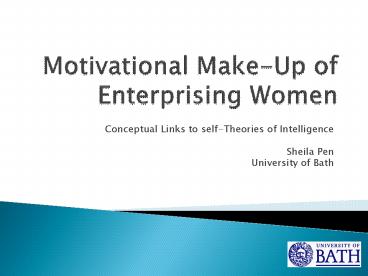Motivational MakeUp of Enterprising Women - PowerPoint PPT Presentation
1 / 15
Title:
Motivational MakeUp of Enterprising Women
Description:
Women into Enterprise ( WiE, ESF programme in Swindon, UK) ... Informal chats and conversations at networking events. Email correspondence. One-to-one coaching ... – PowerPoint PPT presentation
Number of Views:63
Avg rating:3.0/5.0
Title: Motivational MakeUp of Enterprising Women
1
Motivational Make-Up of Enterprising Women
- Conceptual Links to self-Theories of Intelligence
- Sheila Pen
- University of Bath
2
Background Methods
- Women into Enterprise ( WiE, ESF programme in
Swindon, UK) - Women in business, business networking events
- In-depth interviews
- Informal chats and conversations at networking
events - Email correspondence
- One-to-one coaching
3
Traditional Understandings of Motivation
McClelland (1985), Mayo (1927-32), Maslow (1954)
Taylor (1911), Drucker (1954). Maslow (1959)
Herzberg (1959), McGregor (1960)
4
Adapted Diagram Abraham Maslows (1954)
Hierarchy of Needs
Clayton Alderfers (1972) ERG Theory
- Self-determination Theory of Motivation (Deci
Ryan, 1985) - Highlights the importance of intrinsic motivation
in affecting behaviour. - Focus is on growth/development
- Active encouragement from the environment
- Encouragement
- Feedback
- Autonomy
- Relatedness
Growth
Self- Esteem Needs
Relatedness
Existence
5
Types of Motivation
Ken Shah Prof. Param J. Shah
6
Two Theories of Intelligence (Dweck, 2000)
- Entity Theorist (Fixed Mindset of Intelligence)
- Incremental Theorist (Growth Mindset of
Intelligence)
- Views traits of intelligence as fixed entity, and
easily judged from behaviour and performance. - Views mistakes as a threat to exposure to real
intelligence. - Students would enjoy opportunities to look smart
in areas they are already comfortable with, they
require a diet of easy success to maintain
their perception of intelligence. Challenges are
therefore a threat to self-esteem. - Tendency to lead validation seeking individuals
(for competence, likeability, and self-worth) ?
leads to having contingent self-worth.
- Intelligence is malleable and can be cultivated
through learning/development. - views mistakes as part of the growth process.
- Even students with low confidence in their
intelligence will enjoy taking on challenges and
difficult tasks. - What makes them feel smart is engaging,
exerting effort to master something, stretching
their skills and applying knowledge. - Tendency to lead to Growth seeking individuals.
7
Defining Intelligence
_ Effort _ Ability Equation
- Something innate. One can go to school to be
educated (academically), but one doesnt have to
go to school to be smart! - In born ability to learn and evaluate complex
ideas. I dont believe it can be learned from
books. - The ability to survive with the least effort
while still reaping enormous gain.
- Someone who knows how to work hard and sets out
to accomplish a certain task. - The capacity to understand something and think
about it, not just mimicking the facts.
Intelligence should be about the effort that goes
into opening onself to the world and new things. - How much effort one puts into something and your
willingness to learn and do all you can to
understand it.
- Entity Theorists
- Incremental Theorists
8
How the role of Self-theories of Intelligence
Impacts Motivation
- Ability to learn/develop
- Ability to overcome challenges
- Degree of risk aversion/ experimentation
- Self-perception, self esteem link vs. confidence
- Motivation
9
Enterprising Women
- On holding back (Risk perception)
- On making decisions (Assertions and choices)
- On having focus and sustaining motivation
(sustaining self-belief and ability having a
constructive one!)
10
Successful thoughts of Enterprising Women
- Their awareness of their intelligence and
competence as ongoing work-in-development
independent of the outcome of situations. - Does not question self-worth or self ability,
when self-doubt arises instead questions the
doubt to resolve it. - Is outward focussed and inward drawing I know of
this opportunity and wonder how I might be able
to get closer to it.
11
A Different View of Self-esteem
- Entity Theory of intelligence
- Incremental Theory of intelligence
- Self-esteem can be an internal quantity
discernable from behaviour and performance,
easily fed by achieving successes. - Praise is directed to states of intelligence
- Self-esteem with regard to intelligence is
derived from experiencing yourself fully engaged
in doing something that stretches your abilities
in an area you value. - Praise regarding effort and application applied
focussing on the experience reinforces this
theory.
Much of our praises and messages in speech for
people tend to relate to their qualities as fixed.
12
Sustainable Motivation
- There is a regenerating quality to having an
incremental outlook on intelligence that is more
suited for an entrepreneurial pursuit. - This can vastly overcome any dips in time or
situation-based specific influences on an
individuals level of self-esteem or confidence
that is usually attributed to influencing
motivation.
13
Link to Enterprising Spirit
- Can do? Attitude of enterprise
- Handling high stress, uncertainty, social
stretch, personal attachments and challenges - Overcoming the motivational barriers of
enterprise
14
Raising New Questions
- The need to re-envisage our understanding and
conceptualisation of motivation and the intrinsic
elements that feeds it. - If we are to focus on intrinsic motivation we
need a greater understanding to our self theories
which under ride our abilities to perform and
achieve and therefore, influences our motivation. - To question the impacts of our messages,
incentives and support orientation
15
Conclusion
- Under this new link to motivation, achievement is
motivated by the desire to experience competence
and avoid experiencing incompetence according to
a persons theory of their own intelligence. - Some of our earlier conditioning and
environmental set-up in terms of (support
structures) work may be working to reinforce an
entity outlook of our intelligence and
competence. - More sustainable than having confidence is having
an incremental outlook which will motivate a
person to pursue growth.































